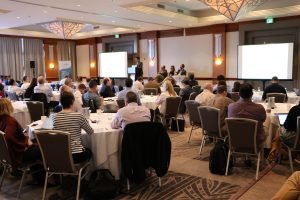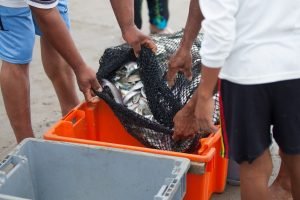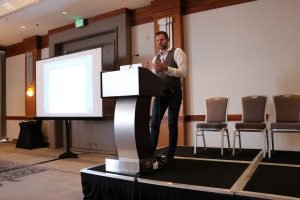
Global Marine Commodities Project participation at T75 Forum.
The National Chamber of Fisheries of Ecuador (CNP) and the Ecuadorian Tuna Pole and Line Association presented the steps they are taking to improve the sustainability of fisheries to international seafood buyers and retailers during the Target 75 Forum in Miami Florida, held February 6-7, 2019.
With the global sustainable seafood market valued at US$12.71 billion in 2017 and growing, there is an opportunity to capitalize. However, to effectively scale up sustainable seafood sales, industry currently faces the challenge of securing a reliable and verifiably sustainable supply.
To help meet this challenge, Sustainable Fisheries Partnership (SFP), a facilitating partner of the Global Marine Commodities (GMC) Project, created its Target 75 Initiative (T75). T75 aims to see 75 percent of world production in key seafood sectors certified sustainable by an international third-party program or making regular, verifiable improvements toward sustainability by 2020.
The GMC project contributes to the T75 target by creating multi-stakeholder dialogue roundtables (i.e. national platforms) for the creation of fishery management plans and new regulations in Costa Rica, Ecuador, Indonesia, and the Philippines. In addition, the GMC Project supports the establishment and facilitates implementation of ten Fishery Improvement Projects (FIPs).
At the T75 Forum, a representative of the National Chamber of Fisheries of Ecuador (Cámara Nacional de Pesquería, CNP) described how the association is fostering public-private partnerships through its work with the Small Pelagic Fishery Improvement Project in Ecuador.
“In a public-private partnership, industrial fleet ships, together with the National Fisheries Institute, are conducting research cruises to feed into stock assessments. All costs are fully covered by private sector funds,” said Carlos Cacao Meléndez, the president of the Small Pelagic Commission of the CNP.

Small Pelagic landing in Puerto López in Ecuador – UNDP Ecuador.
Cacao also noted the positive interaction that the Small Pelagic FIP has with the GMC project.“Through the small pelagic national platform, the same participants of the FIP are working on the design of an active, transparent, participatory, and legitimate governance system for this fishery,” Cacao said. “This space will allow the fishery stakeholders to discuss and approve policies to overcome challenges to the sustainability of the small pelagics fishery.”
As part of the GMC project’s strategy to connect FIPs to international buyers, Augusto Lopez, president of the Ecuadorian Tuna Pole and Line Association, accompanied the GMC delegation to the forum. Lopez presented the Pole and Line Association’s plan to initiate a FIP in order to achieve certified sustainable Yellowfin and Skipjack Tuna, ready for sale to international buyers.
“I appreciate the opportunity to attend this forum and meet representatives from different companies that import tuna,” Lopez said. “The Cañeros de Manta Pole and Line Association is committed to achieving sustainability in our fishery, and we look forward to future engagement with the buyers who purchase sustainable seafood.”
Finally, Christian Severin, the Global Environment Facility’s lead for its International Waters (IW) focal area, presented how the IW portfolio seeks to strengthen national and regional policy and legal frameworks to address challenges affecting the planet’s oceans. Severin reinforced the linkage between T75’s goals and the United Nations’ Sustainable Development Goal (SDG) 14, specifically SDG indicator 14.4, which is closely aligned with T75:

Christian Severin, Global Environment Facility’s lead for International Waters (IW), at T75 Forum.
By 2020, effectively regulate harvesting and end overfishing, illegal, unreported and unregulated fishing and destructive fishing practices and implement science-based management plans, in order to restore fish stocks in the shortest time feasible, at least to levels that can produce maximum sustainable yield as determined by their biological characteristics.
Like T75, the SDGs intend to unite industry, international donors, governments, and NGOs toward common goals for the betterment of global society. Now, it’s up to these players to develop efficient and effective partnerships to drive change forward.
About the GMC Project:
GMC is an interregional initiative implemented by the Ministries and Bureaus of Fisheries and Planning of Costa Rica, Ecuador, Indonesia and the Philippines, with technical support from the United Nations Development Programme (UNDP), facilitated by the Sustainable Fisheries Partnership (SFP), and funded by the Global Environment Facility (GEF).